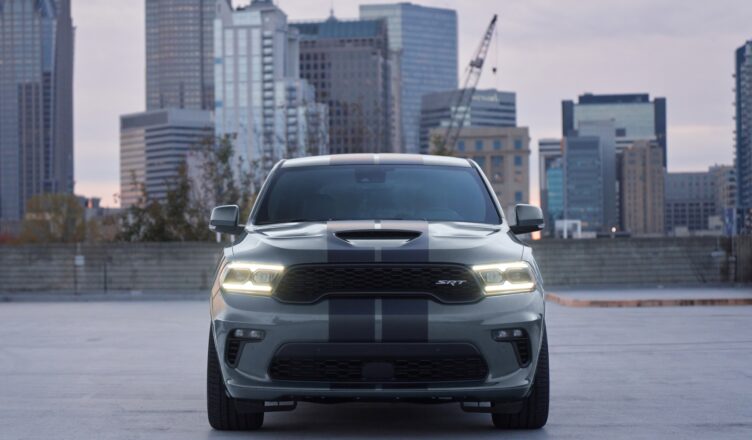It’s been fifteen years since the divorce of Mercedes and Chrysler, but there are living remnants of those nuptials. Buried beneath swaggering muscle car bodies of the Dodge Charger and Challenger is basic architecture from the late-‘90s E-Class driven like demons by HEMI engines. They’ll be recognized as the best muscle cars of all time.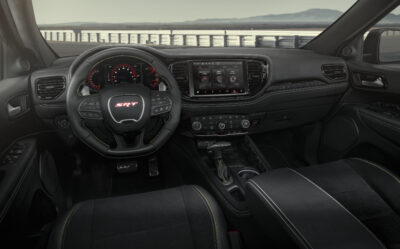
There’s another place you can find German-American engineering: Beneath the Durango three-row crossover that was co-developed with previous-generations of the Mercedes M-Class and Jeep Grand Cherokee. However, you better act fast if you want the 2024 Dodge Durango SRT 392 “Last Call Edition” we have this week.
It definitely has an exuberant personality, what with the black hood graphics, snarling air extractors, yellow pinstripes, and 20” satin black wheels. Check the 392 fender decals and yellow brake calipers too. The Durango’s muscular fenders, sleek roofline, and menacing black mesh grille have aged gracefully, but serve notice to get out of your family’s way. You’ve got places to go – and toot sweet!
The attitude continues inside with yellow piping on the deeply bolstered sueded seats, thick flat-bottom steering wheel, and carbon fiber trim. Sueded headliner, stitched dash, and deeply bolstered front seats foreshadow a hefty window sticker. Given heated and ventilated front seats, heated middle-row captain’s chairs, and booming 19-speaker Harman Kardon audio system, it’s also quite comfortable. The power sunroof welcomes fresh air.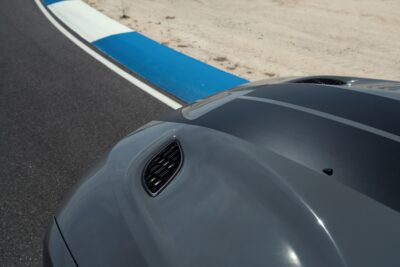
The dash echoes Chargers with its driver-centric lay-out that harbors a large touchscreen. The gauges feel a bit “last-generation”, but it’s all clear and intuitive. I’m still a fan of Chrysler’s control system that combines a touchscreen with simple icons, voice controls, and redundant knobs/buttons below for key audio and climate functions. Wireless charging eases phone connections. Stay safe with adaptive cruise, automatic emergency braking, lane keep assist, blind spot warning, and rear cross path detection systems.
This doesn’t have the supercharged Hellcat engine, but rather a normally-aspirated 6.4-liter HEMI V8 conjuring 475 horsepower and 470 lb.-ft. of torque. It’ll wake your neighbor’s spouse with its bellowing SRT exhaust. All the power shifts to the all-wheel-drive system through an 8-speed transmission. Fuel economy is terrible at 13/19-MPG city/highway, but fossil hugging really isn’t the vibe.
I’ve thoroughly enjoyed this Durango and last-generation Grand Cherokee. There’s a heavy German road feel that clearly comes from Mercedes DNA, but that raucous HEMI could only rumble from America. Clicking through the drive modes adjusts the suspension firmness, steering heft, and throttle response from wafting comfort to bone-jarring track days. I left it in Auto for the best balance of handling and comfort. Sport is for weekend backroads while Track should only be used, well, on a track.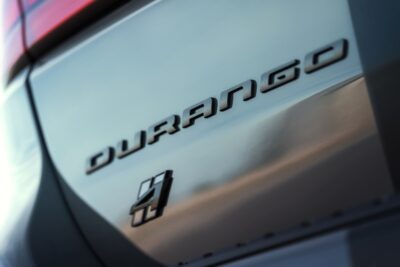
Only 1,000 units of the Durango SRT 392 AlcHEMI “Last Call” edition will be built before production ceases in July. After that, there will be a short run of Hellcat-powered Durangos for 2025 before production closes altogether in December. We don’t yet know if the Durango will join the Grand Cherokee on its new Fiat-derived architecture or roar off down its final two-lane road, but we’ll surely miss the family crossover for muscle car enthusiasts.
The price already reflects collector potential. While the base Durango starts at a very reasonable $39,670, the SRT 392 “Last Call” begs closer to six figures ($91,785 to be exact). Yikes. No competitors combine German engineering with American power, but the Mercedes-AMG GLE 53, BMW X5 M, and Cadillac Escalade-V are in-fact assembled in the U.S.
2024 Dodge Hornet Offers Affordable Alternative to Durango, Speaks with Own Accent
If you’re still recovering from the nearly six-figure price of the Dodge Durango 392, let’s travel from Germany to Naples, Italy from where the compact Dodge Hornet crossover hails. Essentially an Alfa Romeo Tonale clone with muscular Dodge styling, it makes a strong case as an affordable performance crossover with a touch of heritage.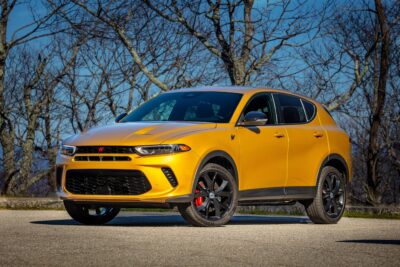
Forget HEMIs; the base Hornet GT harbors a 2.0-liter turbocharged four-cylinder engine delivering 268 horsepower and 295 lb.-ft. of torque. Run 0-60 mph in just 5.6 seconds. Or, choose the R/T plug-in hybrid with 32 miles range. An abundant 288 horsepower and 383 lb.-ft. of torque move it 0-60 mph in 6.5 seconds. See, you don’t need a HEMI to take the kids to school!. Koni shocks, Brembo brakes, and torque-vectoring AWD ensure the Hornet remembers its Italian roots when roads become fun.
I drove a Hornet GT a year ago and the similar plug-in Alfa this spring. The Hornet cribs Alfa with deeply bolstered black leather sport seats, flat bottom steering wheel, and red stitching throughout. Flatscreen gauges are concise and the slick center screen looks artful. I have no complaints about wireless Apple/Android connectivity, sumptuous Harman Kardon audio, or dual-zone automatic climate control. Safety is enhanced by adaptive cruise, lane-centering steering, and automatic emergency braking. Blind spot warning, rear cross path detection, and surround-view camera come too.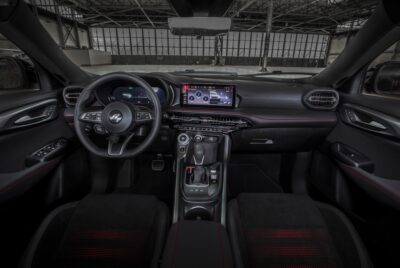
Like the Durango, the Hornet has snarling air extractors on its hood, angry logos on its flanks, and looks menacing with 18” black wheels, but the curvy muscular sheetmetal would look as sexy in Tuscany as Tucson. Prices start at a much more palatable $31,400.
Storm Forward!
Send comments to Casey at AutoCasey@aol.com; follow him on YouTube @AutoCasey.
